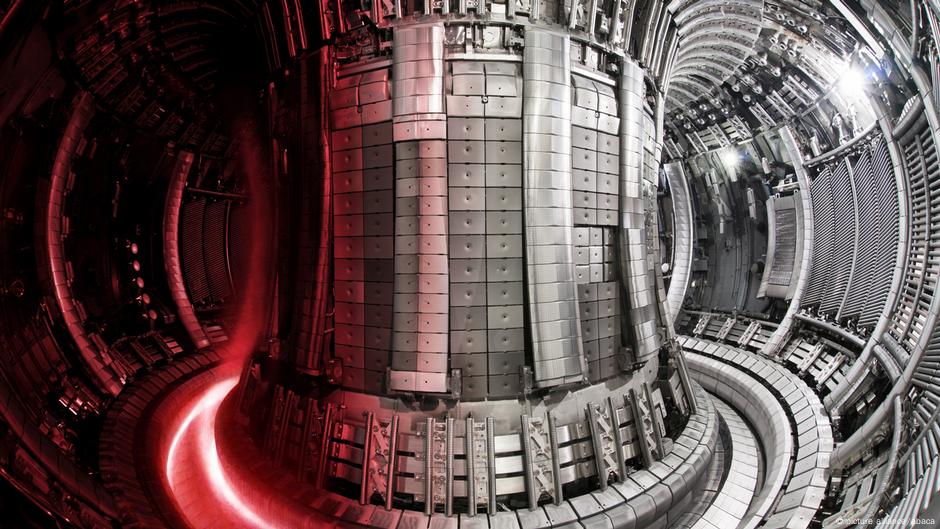consumes vast amounts of energy to sustain its manufacturing might and energy-intensive industries like and chemicals.
The country, , still relies heavily on fossil fuels for its energy needs even though the share of has risen steadily over the past two decades.
The German government has been implementing an to achieve net-zero greenhouse gas emissions by 2045. It completely phased out nuclear power in 2023, and plans to wean itself off coal by 2038.
To balance the energy and , Berlin is also betting on new technologies such as green hydrogen and nuclear fusion.
A smart bet?
Chancellor Cabinet this month unveiled an action plan to accelerate the development of nuclear fusion technology. It wants Germany to build the world’s first fusion reactor, allocating €1.7 billion ($1.98 billion) in funding for the project.
Berlin hopes the technology will provide abundant clean, safe and reliable energy in the future.
Sarah Klein, commissioner for fusion research at the Fraunhofer Institute for Laser Technology in Aachen, Germany, says investing in fusion technology is a “smart long‑term strategic bet.”
“[It] keeps Germany at the forefront of a global technology race and — alongside renewables — is crucial for ensuring energy sovereignty after the phaseout of fossil fuels,” she told DW.
Sibylle Günter, scientific director of the Max Planck Institute for Plasma Physics, agreed, noting that German energy demand is “rising steadily.”
“Nuclear fusion is a technology that can help us secure our energy supply without CO2 emissions in the long term and remain competitive as an industrial nation,” Günter told DW.
‘Catalyst for innovation’
Scientists have sought to harness nuclear fusion to generate energy.
It involves bashing together two light atomic nuclei at such high temperatures and pressure that they fuse, and release energy. It’s the same basic process that sees hydrogen in the sun converted into helium, generating sunlight and making life on Earth possible.
Fusion is a reverse of what happens in today’s nuclear power plants — — where large atoms are split in a chain reaction to release energy.
Unlike nuclear fission, nuclear fusion leaves behind no radioactive waste, thus holding the promise of delivering abundant, climate-friendly energy without pollution and radioactive waste.
Germany is not alone in betting big on nuclear fusion.
Countries like the US, China, Japan and the UK have been pumping billions into accelerating the development of the technology. In addition, dozens of private startups have joined the fray.
“The most innovative economies in the world are already making substantial investments in fusion. Therefore, investing in fusion is a vital future strategy for Germany’s high-tech sector,” Klein said.
The Fraunhofer scientist underlines that the investment is crucial for the country to remain competitive on the global stage and secure technological sovereignty.
“Beyond the science, fusion acts as a catalyst for innovation,” she said, pointing to other critical technologies such as superconducting magnets, high‑power systems, advanced materials, robotics and .
“It is vital to involve industry stakeholders early to initiate and leverage spillover effects into other markets,” she added.
Waste of money?
Critics, however, view the spending of vast sums on the pursuit of nuclear fusion as misguided and a waste of resources. They argue that the money could be better spent on scaling up other renewable projects.
But Sibylle Günter is convinced there mustn’t be a “conflict between renewables and fusion energy” as the two can “complement each other.”
“Wind and solar power cannot supply electricity continuously, but fusion can. Fusion can also provide process heat for industry and energy for the production of synthetic fuels such as hydrogen,” she said.
After decades of research, — meaning the energy delivered by the fusion reaction was higher than what was used to make the atomic nuclei fuse — at the end of 2022.
The experiment used high-powered lasers to achieve the feat.
Other concepts use strong magnetic fields to confine super-hot plasma particles that combine and fuse to release energy.
When will fusion power plants become reality?
The 2022 breakthrough and subsequent experiments have raised hopes of unlocking fusion’s full potential in the near future.
Daniel Kammen, professor of energy at the University of California in Berkeley, thinks the “old adage” that nuclear fusion is five decades away, and has been five decades away for many decades is “no longer true.”
“Advances in the diversity of approaches, in the use of machine learning and AI to control issues like magnetic (tokamak) confinement, and in system operation have all radically changed the situation,” he told DW in an emailed statement.
“I have forecast that fusion prototypes will be in the pilot phase on the grid within a decade, and possibly sooner.”
But other experts, including Sarah Klein, say it will take longer for commercially viable fusion power to materialize. “It’s true that commercial fusion remains a long‑term prospect with significant technical and economic uncertainty. So it cannot substitute for the urgent deployment of renewables and storage today.”
Klein’s view is shared by Sibylle Günter, who expects the first fusion-power plants to go on the grid “in about two decades,” but only if the necessary efforts are made now.
“The question is: Are we prepared today to invest in a technology so that it will be available when we need it to meet our growing energy needs?”
Edited by: Uwe Hessler
The post Germany bets billions on nuclear fusion to secure clean energy future appeared first on Deutsche Welle.




